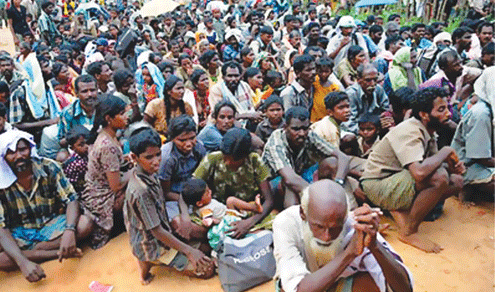
Sunday, 15th June 2014

By Camelia Nathaniel
The implementation of the recommendations of the Lessons Learnt and Reconciliation Commission (LLRC) by the Government is continuing through the National Plan of Action (NPoA). So far of the 285 paragraphs contained in Chapter 9 of the LLRC, the Government has identified 144 as recommendations for immediate implementation. As of June 3, 2014, out of the 144 recommendations of the LLRC, 45 recommendations have achieved their objectives, while there are 89 recommendations where implementation has progressed to a substantial extent with long-term time-frames, and 10 recommendations where initial steps are being taken for implementation.
With regard to the rehabilitation of the ex LTTE combatants, the Bureau of the Commissioner General of Rehabilitation (BCGR) states that there are 132 former members of the Liberation Tigers of Tamil Eelam (LTTE) currently undergoing rehabilitation.
According to the Commissioner General of Rehabilitation Maj. Gen. Jagath Wijetilleke nearly 12,000 former LTTE cadres either surrendered or were taken into custody following the end of the war in 2009.
The remaining 132 ex-LTTE combatants are currently undergoing the one-year rehabilitation programme that is jointly conducted by the Sri Lanka Army and BCGR at the Poonthottam Rehabilitation Centre in Vavuniya. Out of those who have already completed their rehabilitation programme and reintegrated back into society, more than 230 have qualified to pursue higher education while 35 are currently studying at universities. Since the end of the war in May 2009, the Government has spent Rs. 2.5 billion for the rehabilitation of former LTTE cadres. In 2013, the Government increased the allocation for these programmes from Rs. 300 million to Rs. 500 million.
Child combatants
In the case of Child Combatants, all 594 ex-child combatants, comprising 364 males and 230 females, have been rehabilitated and reintegrated into society by May 2010. All those who had missed out on their schooling during the conflict period were facilitated to gain formal education and those eligible for G.C.E (O/L) and (A/L) sat these examinations undergoing special education programmes and tuition classes under the “Catch up Education Scheme”. 169 qualified to enter university. Further, 322 ex-child combatants received vocational training in order to be gainfully employed.
3,344 rehabilitees comprising 1,600 with permanent disabilities and 1,744 with minor injuries have been rehabilitated and re-integrated. A further 82 remain in Rehabilitation Centres. Meanwhile all rehabilitants with permanent disabilities (1,619) have been made entitled to receive a monthly allowance of Rs 3,000/-. To date, 228 beneficiaries have submitted applications, while awareness programmes have been conducted at village level to educate other disabled beneficiaries requiring this assistance, and consequently a further 100 disabled ex-combatants have submitted applications. Disabled ex-combatants are also granted a loan of Rs 25,000/- to commence livelihood projects.
Meanwhile in circumstances under which specific instances of death or injury to civilians could have occurred, allegations of summary executions of captured persons are being investigated by an Army Court of Inquiry, through a comprehensive procedure involving interviewing all relevant Field Commanders and potential witnesses.
The first Part of the court of inquiry regarding allegation with regard to civilian casualties concluded in Feb 2013. According to the NPoA, the Inquiry has concluded that instances of shelling referred to in the LLRC Report were not caused by the Sri Lanka Army and civilian casualties might have occurred due to unlawful acts by LTTE. These acts include targeting civilians fleeing to the safety of Army held areas and likely routes of escape, dropping of artillery rounds fired by ill-trained LTTE gunners on to civilian concentrations etc.
Meanwhile The Presidential Commission to Investigate into Complaints Regarding Missing Persons completed its fourth round of Public Sittings in the Batticaloa District earlier this week.
The Commission had previously conducted Public Sittings in January, February and March this year in Killinochchi, Jaffna and Batticaloa, respectively. So far 18,590 complaints have been received from many parts of the country, inclusive of approximately 5,000 from relatives of missing security forces personnel. Accordingly the Commission has thus far inquired into 462 complaints, which are being reviewed for further investigations through an independent investigation team.
The Commission has also held regular meetings with the ICRC, the UNDP and obtained their views and experiences gained in other parts of the world on matters relating to persons missing at the end of a conflict. The mandate issued to the Commission of Inquiry to investigate cases of alleged disappearances of persons in the Northern and Eastern Provinces has been extended by six months to August 12, 2014.
Missing persons have fled Sri Lanka
However according to the CID there have been many instances where those reported missing have in fact been found in other areas or countries, in some cases under false names. They also stated that while the Sri Lankan Government has repeatedly requested countries where large numbers of Sri Lankans have resettled or are seeking refugee status, to provide their details, so far there has not been much corporation from these countries. It is believed that many of those reported missing could be residing in other countries having illegally left Sri Lanka by boat.
Further to the implementation of the LLRC recommendations regarding resettlement, so far nearly 766,307 IDPs (226,239 families) have been resettled from 2009 to April 2014 in the Northern and Eastern Provinces. Accordingly as at May 31, 2014, according to the Joint Study between Ministry of Resettlement, PTF and UNHCR, 30,007 persons (9,073 families) remain to be resettled, which includes 22,453 persons (6,766 families) from the North and 7,554 persons (2,307 families) from the East.
As recommended by the LLRC, the Government has mobilised funding compensation for those affected by the conflict. Rs. 596 Million has been provided for the payment of compensation from 2010 to 2013, while the 2014 budget has allocated Rs. 475 Million to continue the implementation of this recommendation. Compensation schemes have also been implemented by the Rehabilitation Authority to provide relief for the next of kin affected by the death or injury of those involved with the LTTE. Such relief is also provided in cases of property damage due to the conflict, including religious places. The Rehabilitation Authority has in this regard implemented several loan and compensation schemes at a cost of Rs. 1.32 Billion.
Shortcomings
However in spite of the government claims that the implementation of the LLRC recommendations are being implemented successfully, certain Human Rights groups believe that there are many shortcomings in the implementation process.
The Press Officer Asia/Pacific, Amnesty International – International Secretariat Olof Blomqvist told The Sunday Leader that as Amnesty International has noted before, the Lessons Learnt and Reconciliation Commission (LLRC) had shortcomings.
“It lacked sufficient independence and witness protection, as well as the apparent will and ability to adequately address war crimes and crimes against humanity committed during the final phases of the conflict. But the LLRC’s concluding report did acknowledge grave human rights violations in Sri Lanka – including reports of arbitrary arrest and detention, torture and enforced disappearances – and called for investigation, prosecution and punishment of perpetrators.
It also made a number of useful recommendations aimed at ensuring redress and protection to victims of violations. These recommendations have largely been ignored by Sri Lankan authorities. This is despite repeated calls on the authorities from Amnesty International, the UN Human Rights Council and many others on the Sri Lankan government to implement the LLRC’s main recommendations immediately.”
He charged that the government’s response to the LLRC report – its Plan of Action – failed to commit to new or independent investigations into crimes against humanity and war crimes, and relied on the military and police – allegedly implicated in serious violations of human rights and humanitarian law – to investigate themselves.
“Justice for victims of violations of international law is still a remote goal in Sri Lanka, and the government has so far shown itself unwilling and unable to investigate the serious accusations of violations leveled against it. The upcoming investigation led by the Office of the UN High Commissioner for Human Rights offers a ray of hope to the tens of thousands who have suffered abuses; the Sri Lankan Government should cooperate with the UN on this inquiry,” he added.
Meanwhile Meenakshi Ganguly the South Asia director, Human Rights Watch speaking to the Sunday Leader said that Sri Lanka has made progress in humanitarian work in terms of resettlement and rehabilitation. However she pointed out that accountability issues remained mostly ignored.
“Although the government rightly denounces the LTTE’s atrocities, it shelters from prosecution former LTTE commanders who are closely associated with the forced recruitment of child soldiers and other LTTE abuses. The Sri Lankan authorities’ standard response is to either ignore or flatly deny any wrongdoing on its part during the military operations, and to instead harass and intimidate those who dare advocate on behalf of victims and in support of rights.
Thus victims are still awaiting justice and accountability. There are still no answers for the up to 40,000 civilian deaths from the last months of the fighting. We hope that the Human Rights Council resolution to have an independent investigation will be an effort that the government will support, as it should if it is serious about implementing the LLRC recommendations,” she said.
From : http://www.thesundayleader.lk/2014/06/15/progress-in-implementing-llrc-proposals/




